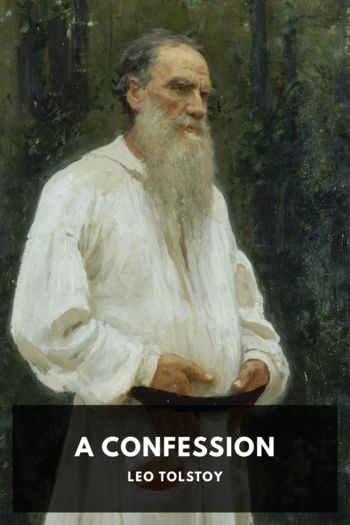A Confession by Leo Tolstoy (all ebook reader .txt) 📕

- Author: Leo Tolstoy
Book online «A Confession by Leo Tolstoy (all ebook reader .txt) 📕». Author Leo Tolstoy
And all this befell me at a time when all around me I had what is considered complete good fortune. I was not yet fifty; I had a good wife who loved me and whom I loved, good children, and a large estate which without much effort on my part improved and increased. I was respected by my relations and acquaintances more than at any previous time. I was praised by others and without much self-deception could consider that my name was famous. And far from being insane or mentally diseased, I enjoyed on the contrary a strength of mind and body such as I have seldom met with among men of my kind; physically I could keep up with the peasants at mowing, and mentally I could work for eight and ten hours at a stretch without experiencing any ill results from such exertion. And in this situation I came to this—that I could not live, and, fearing death, had to employ cunning with myself to avoid taking my own life.
My mental condition presented itself to me in this way: my life is a stupid and spiteful joke someone has played on me. Though I did not acknowledge a “someone” who created me, yet such a presentation—that someone had played an evil and stupid joke on me by placing me in the world—was the form of expression that suggested itself most naturally to me.
Involuntarily it appeared to me that there, somewhere, was someone who amused himself by watching how I lived for thirty or forty years: learning, developing, maturing in body and mind, and how, having with matured mental powers reached the summit of life from which it all lay before me, I stood on that summit—like an arch-fool—seeing clearly that there is nothing in life, and that there has been and will be nothing. And he was amused. …
But whether that “someone” laughing at me existed or not, I was none the better off. I could give no reasonable meaning to any single action or to my whole life. I was only surprised that I could have avoided understanding this from the very beginning—it has been so long known to all. Today or tomorrow sickness and death will come (they had come already) to those I love or to me; nothing will remain but stench and worms. Sooner or later my affairs, whatever they may be, will be forgotten, and I shall not exist. Then why go on making any effort? … How can man fail to see this? And how go on living? That is what is surprising! One can only live while one is intoxicated with life; as soon as one is sober it is impossible not to see that it is all a mere fraud and a stupid fraud! That is precisely what it is: there is nothing either amusing or witty about it, it is simply cruel and stupid.
There is an Eastern fable, told long ago, of a traveller overtaken on a plain by an enraged beast. Escaping from the beast he gets into a dry well, but sees at the bottom of the well a dragon that has opened its jaws to swallow him. And the unfortunate man, not daring to climb out lest he should be destroyed by the enraged beast, and not daring to leap to the bottom of the well lest he should be eaten by the dragon, seizes a twig growing in a crack in the well and clings to it. His hands are growing weaker and he feels he will soon have to resign himself to the destruction that awaits him above or below, but still he clings on. Then he sees that two mice, a black one and a white one, go regularly round and round the stem of the twig to which he is clinging and gnaw at it. And soon the twig itself will snap and he will fall into the dragon’s jaws. The traveller sees this and knows that he will inevitably perish; but while still hanging he looks around, sees some drops of honey on the leaves of the twig, reaches them with his tongue and licks them. So I too clung to the twig of life, knowing that the dragon of death was inevitably awaiting me, ready to tear me to pieces; and I could not understand why I had fallen into such torment. I tried to lick the honey which formerly consoled me, but the honey no longer gave me pleasure, and the white and black mice of day and night gnawed at the branch by which I hung. I saw the dragon clearly and the honey no longer tasted sweet. I only saw the unescapable dragon and the mice, and I could not tear my gaze from them, and this is not a fable but the real unanswerable truth intelligible to all.
The deception of the joys of life which formerly allayed my terror of the dragon now no longer deceived me. No matter how often I may be told, “You cannot understand the meaning of life so do not think about it, but live,” I can no longer do it: I have already done it too long. I cannot now help seeing day and night going round and bringing me to death. That is all I see, for that alone is true. All else is false.
The two drops of honey which diverted my eyes from the cruel truth longer than the rest: my love of family, and of writing—art as I called it—were no longer sweet to me.
“Family” … said I to myself. But my family—wife





Comments (0)